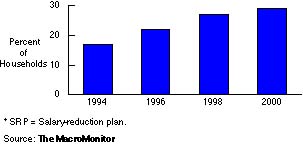Financial Illiteracy: The Challenge in Retirement Planning MacroMonitor Marketing Report Vol. V, No. 8 March 2002
The proportion of U.S. households that participate in salary-reduction plans (SRP) almost doubled between 1990 and 2000, rising from 20% to 39%. Moreover, as more households shoulder the investment risk of their retirement savings, the need grows to educate and advise employees about diversification and investment options. MacroMonitor data show that many consumers do not know what to do about retirement investing:
Nonretired SRP* Participants Who Don't Know
Where Their SRP Assets Are

The decline or outright evaporation of workers' pension assets in high-profile cases like the Enron pension tragedy and double-digit declines in stock returns in the past two years have heightened average consumers' awareness of the need to pay more attention to their retirement investments. But many of these consumers do not have the time, expertise, or desire to manage their retirement investments. The retirement-planning market thus presents significant opportunities to offer all levels of retirement advisory and guidance services, but especially those that serve disinterested and unmotivated retirement investors.
The market boom in the 1990s masked investor ignorance: People's investments grew no matter what they did. Now the personal burden of investing for retirement is more real, making retirement-plan participants more receptive to advice. But in the new investment environment, consumers' trust in the reliability, accuracy, and truthfulness of analysts, accountants, and corporate executives has wavered. Financial institutions will thus need to work consciously and conspicuously to gain and build trust at the same time that they aim to make retirement planning relatively easy and painless. In addition to devising creative financial-education programs and offering simple solutions to the complex retirement-investing process, financial institutions need to take every opportunity to increase positive interactions and relationships with retirement investors.
- The majority of nonretired households with SRPs have no idea how much money to save for retirement.
- Three in ten nonretired households with an SRP don't know what financial products their retirement assets are invested in.
- The most vulnerable households—lower- and middle-income households whose retirement assets typically account for a larger portion of their total savings than those of high-income households—are also the least likely to manage their accounts actively.
Where Their SRP Assets Are

The decline or outright evaporation of workers' pension assets in high-profile cases like the Enron pension tragedy and double-digit declines in stock returns in the past two years have heightened average consumers' awareness of the need to pay more attention to their retirement investments. But many of these consumers do not have the time, expertise, or desire to manage their retirement investments. The retirement-planning market thus presents significant opportunities to offer all levels of retirement advisory and guidance services, but especially those that serve disinterested and unmotivated retirement investors.
The market boom in the 1990s masked investor ignorance: People's investments grew no matter what they did. Now the personal burden of investing for retirement is more real, making retirement-plan participants more receptive to advice. But in the new investment environment, consumers' trust in the reliability, accuracy, and truthfulness of analysts, accountants, and corporate executives has wavered. Financial institutions will thus need to work consciously and conspicuously to gain and build trust at the same time that they aim to make retirement planning relatively easy and painless. In addition to devising creative financial-education programs and offering simple solutions to the complex retirement-investing process, financial institutions need to take every opportunity to increase positive interactions and relationships with retirement investors.